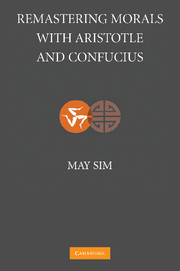Book contents
- Frontmatter
- Contents
- Acknowledgments
- Abbreviations
- Introduction
- 1 Aristotle in the Reconstruction of Confucian Ethics
- 2 Categories and Commensurability in Confucius and Aristotle: A Response to MacIntyre
- 3 Ritual and Realism in Early Chinese Science
- 4 Harmony and the Mean in the Nicomachean Ethics and the Zhongyong
- 5 The Moral Self in Confucius and Aristotle
- 6 Virtue-Oriented Politics: Confucius and Aristotle
- 7 Making Friends with Confucius and Aristotle
- Glossary of Chinese Terms
- Name Index
- Subject Index
7 - Making Friends with Confucius and Aristotle
Published online by Cambridge University Press: 18 July 2009
- Frontmatter
- Contents
- Acknowledgments
- Abbreviations
- Introduction
- 1 Aristotle in the Reconstruction of Confucian Ethics
- 2 Categories and Commensurability in Confucius and Aristotle: A Response to MacIntyre
- 3 Ritual and Realism in Early Chinese Science
- 4 Harmony and the Mean in the Nicomachean Ethics and the Zhongyong
- 5 The Moral Self in Confucius and Aristotle
- 6 Virtue-Oriented Politics: Confucius and Aristotle
- 7 Making Friends with Confucius and Aristotle
- Glossary of Chinese Terms
- Name Index
- Subject Index
Summary
Confucius and Aristotle agree that friendship is central to the ethical life. Aristotle says that friendship is a virtue or involves virtue. Confucius says that the right kinds of friendship lead one to virtue. Both believe that genuine friends exhibit certain virtues and help each other to cultivate them. They agree that friendship is pleasant as well as useful, though friendships based solely on pleasure or utility are deficient. Aristotle and Confucius concur that cultivation and expression of virtue is the main point of friendship and its service to human life.
The differences between Aristotelian and Confucian friendship flow from their metaphysics. As I have shown in earlier chapters, Aristotle's explicit metaphysics has no counterpart in original Confucianism. I will show how Aristotle's metaphysics leads him to divide friendship into three types and to order them hierarchically toward a focal sense that is most final, complete, and self-sufficient. Confucius makes no explicit distinction between kinds of friendship, though we can find examples in Confucius' Analects that fall roughly under the three Aristotelian types. This is not merely a failure to be explicit but is a symptom of metaphysical leanings that shape his own views about human beings and their relationships, knowledge, and actions.
Commentators agree that Confucius is more concerned with practice than theory, but they disagree about whether theorizing would be a useful supplement, an innocuous addition, or a serious detraction from the Confucian way.
- Type
- Chapter
- Information
- Remastering Morals with Aristotle and Confucius , pp. 194 - 212Publisher: Cambridge University PressPrint publication year: 2007



